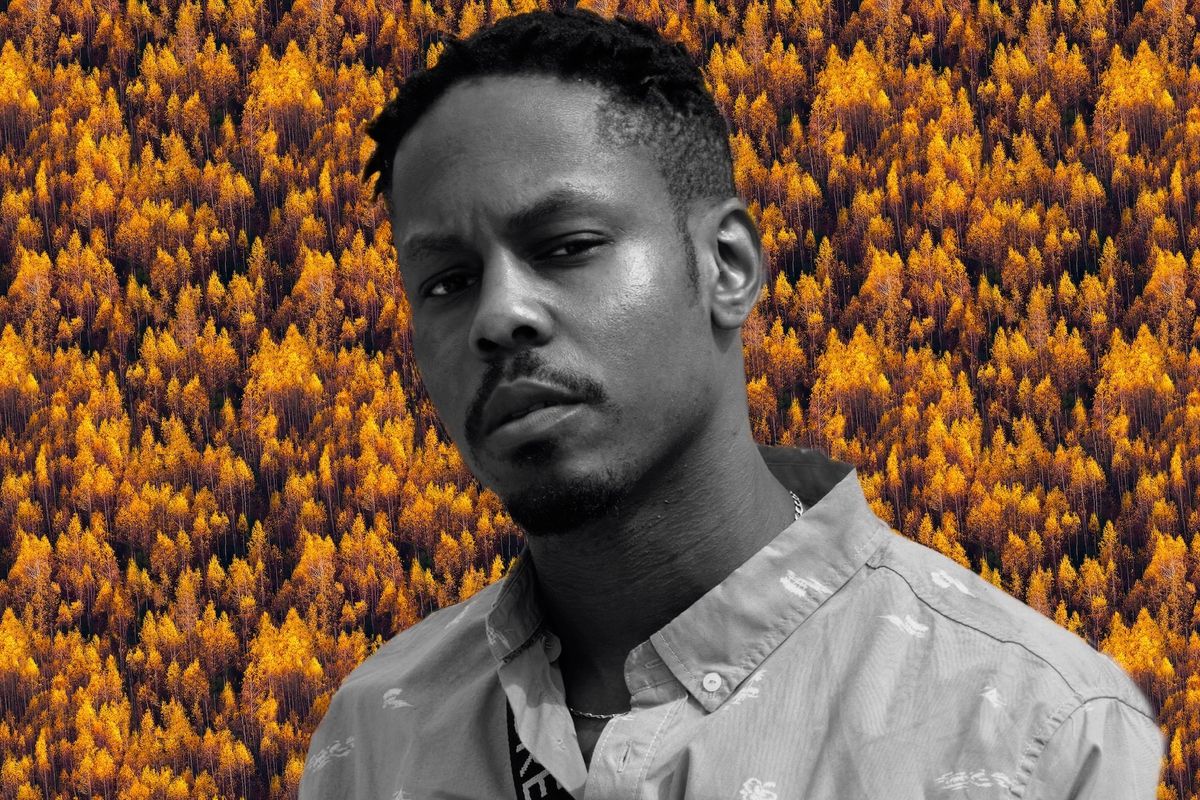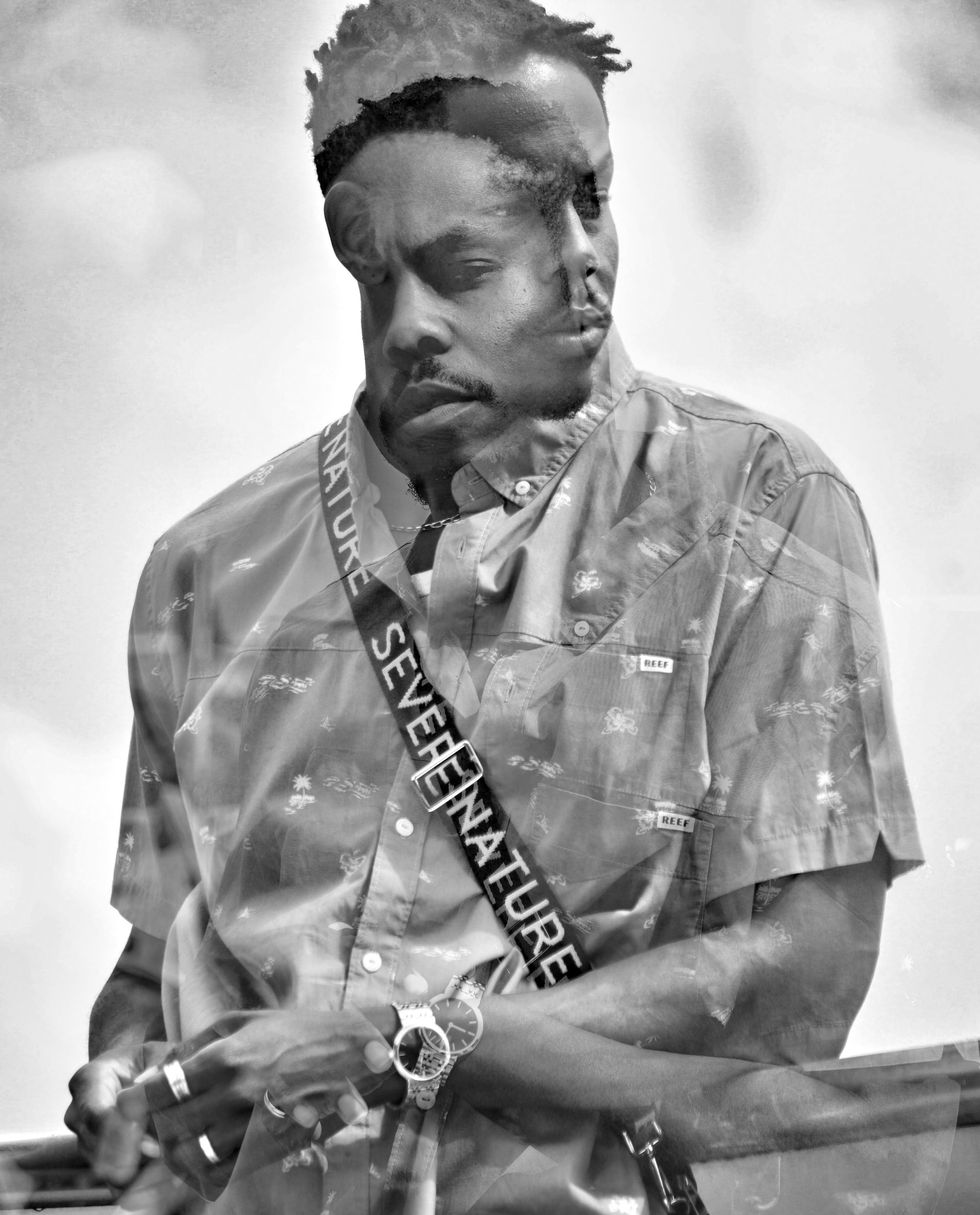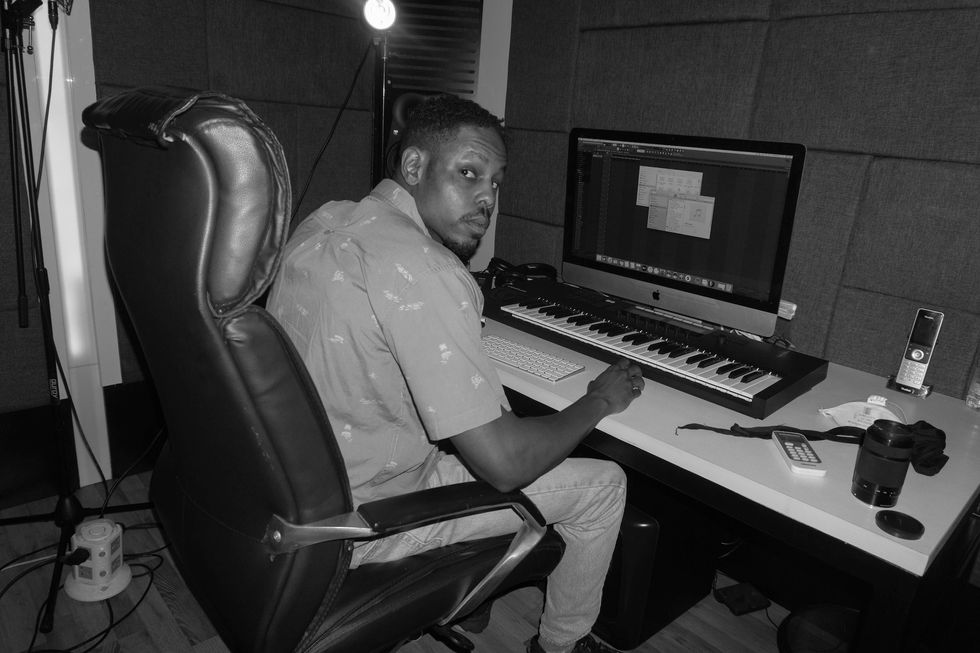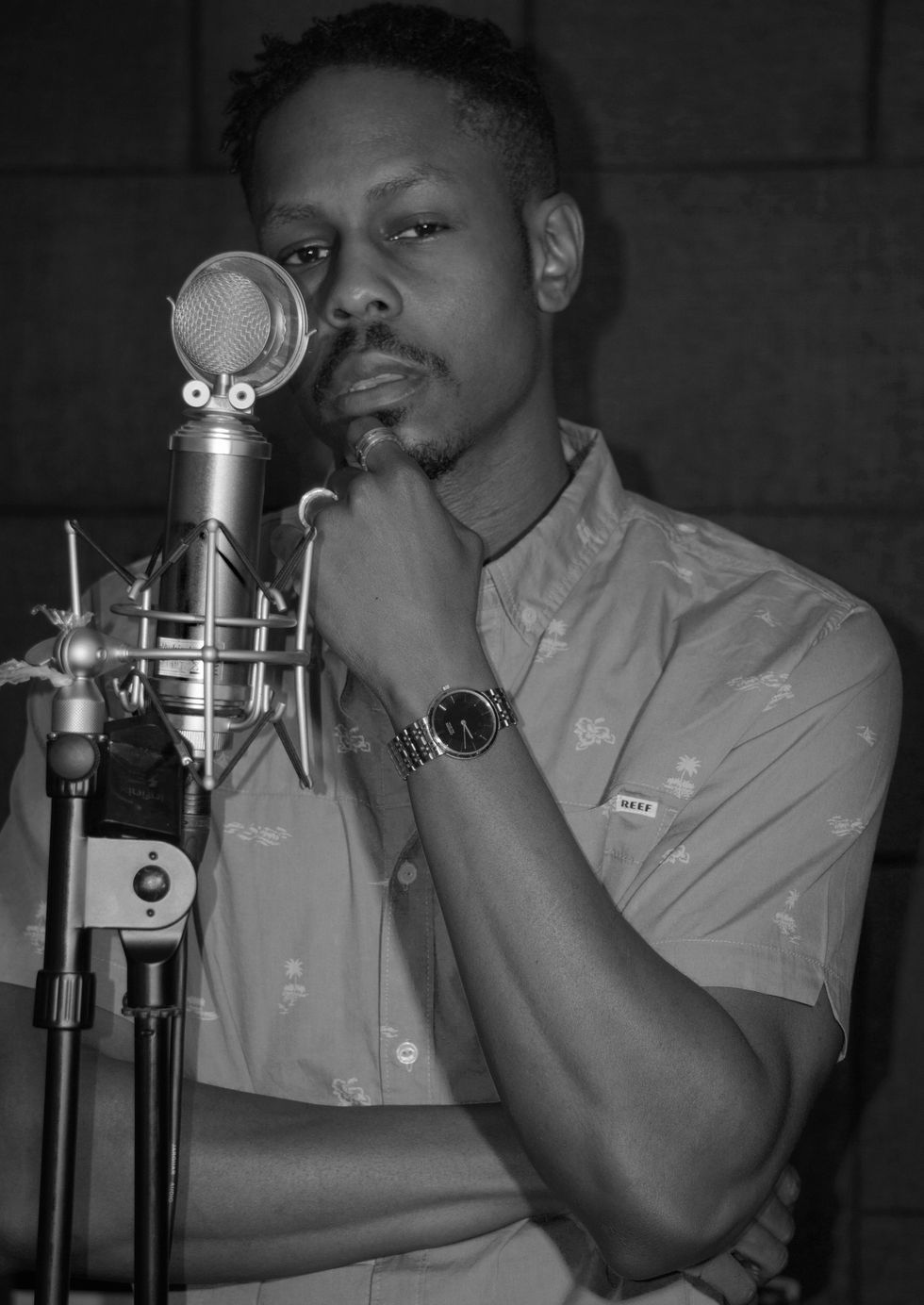Interview: Ladipoe Is the 'Leader of the Revival'
Mavin Records' Ladipoe has become one of Nigeria's hip-hop stars. We caught up with him to talk about how he got into rap, what he's currently working on, and what makes him tick.

Ladipoe.
The true meaning of hip-hop in African contexts has perpetually been the subject of an identity struggle between rapper and listener. What does African hip-hop truly mean and sound like to us?
Decades have passed and the question still casts a dark shadow over a genre that's struggled to be as popular as Afrobeats, Afropop, and other alternative sounds. However, a glance at the amount of recent African hip-hop hits hints that the ebb and flow of interest seems to be moving in hip-hop's favor. The most recent artist at the helm of African hip-hop charting success is Nigerian rapper Ladipoe.
On meeting Ladipoe, a simple answer was presented to me: our hip-hop is simply fusion, that's the only way it can live up to our expectations of it. For a genre born from a place of racial struggle––an issue we don't overtly relive on a daily basis––we have to identify with it in our own way. Through melody, by merging hip-hop with the poppy, introspective, drum driven, upbeat elements that make up the African sound, we can arrive at something that we understand and call our own.
Ladipoe presents this idea perfectly in his latest single "Know You" featuring Simi. The song blends storytelling in lyricism, a key recipe for a good hip-hop track, and the beautiful Afropop melodies of Simi. "Know You" inspired a new direction for the sound, one the self proclaimed 'Leader of the Revival' has been perfecting with hits like "Lemme Know" and "Jaiye."
Ladipoe is signed to one of Nigeria's leading labels Mavin Records, along with burgeoning stars such as Rema, Crayon, and Korede Bello. He has grown into one of Nigeria's leading men in the hip-hop scene with one stellar project under his belt. With the success of his new single, we caught up to talk about how he got into rap, what he's currently working on, and what makes him tick.
This interview has been edited and condensed for clarity.

Tell me about how you grew up.
I lived in Ikoyi when I was really young then I moved to Ikeja GRA, pretty much lived there all my life. This is a GRA that was secluded, but at the same time right behind my house was Shogunle. You had this residential area and very commercial area next to each other so I had the duality. You wake up to birds in the morning and at night you hear the trains. Trees, birds, trains, breeze, and generators were constant sounds of my childhood. One thing GRA had in general was a lot of space, and by space I mean outdoors like the streets, playing football, riding your bike, trekking. that for me, encouraged my imagination and that kinda influenced a bit of me. My dad too was always involved in our creative projects, one-hundred percent.
How did your music taste develop from this?
The most confusing thing about my career and my dexterity as an artist, songwriter, performer, rapper is that I can't tell you where it developed from. I definitely had music around me growing up, my dad is a one-hundred percent Nigerian and Yoruba man, he spent most of his life in Ibadan but he schooled in America so his music had a lot of American influences, my mum too. They were what my mum calls 'hip.' There was no indication I was going to go into music. My parents were as surprised as I was. The first album I ever owned was Jay-Z's Blueprint. But I feel a lot of people from my generation grew up on that Channel-O vibe, we were all connected to music and hip-hop in the same way. We grew up around this listening to it.
Did schooling in America shape you and your career to be a rapper?
You have to figure out who you are quickly. you need to know your identity because you came up as a Nigerian but you're also very much Americanized in terms of the things you watch on TV and music. So, you sort of have that connection but then you realize how different you are from them, you don't realize how different you are until you're there. That accent you were using in secondary school to impress that babe is not an American accent, it's actually a Nigerian boy's accent trying to be American. You don't realize how far apart till you're there and they let you know that. For me the stages for me were, 'America everything is big and you can have fries with that too' and then I started school and it was an identity crisis figuring out who you are.
I schooled in the middle of nowhere, I helped co-found the [school's] African organization because there wasn't any then. And when your identity comes back, you know who you are, you know what you're standing for, you correct people when they pronounce your name wrong. It's funny but that's how 'Poe' came, it was born from the mispronunciation of 'Ladipo.' My roommate decided to call me Poe cause he couldn't call my real name and it stuck.

When did you start rapping?
I had friends, started a clique with my core guys, Greg, Jeff and Kurt.Jeff tells me he makes music and plays a track called "The Journey," produced by Kurt, and I tell him to leave the song with me. The next day I have 16 bars. I always liked words, I've loved films, stories, narratives, I liked to read and did well in literature in school so all that shit kind of poured out and I had shit to say. In America it was a great time because you find yourself. You do have to know who you stand for and be unshakable in that identity when other people either don't like it or people ridicule it, growth can only start when you're secure, you have roots.
What happened after that track?
Jeff, Kurt and I formed a clique called Lyrically Equipped, we did a first album called Rhymes and Reason, another one Hip Hop Anonymous and then I grew as an artist. I really love Phonte from Little Brother, such an inspiration the way he rhymed. I really like Drake, before So Far Gone, I gravitated towards a less hectic style of rapping and Drake embodied everything I liked about Phonte. But he also appealed to me because as a young Nigerian I grew up with melodies, every Nigerian is exposed to different melodies from Wombolombo, to church songs, you have musicality around and Drake embraced that side of him. I was so invested in the music at some point because Kurt was a music student so he had access to the studio and this made me better at recording, but rapping still had to be a hobby because I was the only one getting texts from their mum in Nigeria and I had to graduate with honors which I did.
When were you sure rapping was what you wanted for the rest of your life?
I was back in Nigeria, NYSC, then I got a job and I was working. Getting a job was about sustenance, my parents sacrificed a lot to give me a good education, they had half a life because of us and the sacrifice was something I can't ignore, so getting a job was about helping and contributing but the music gave me life. SDC and I linked up cause my mum and Tec's mum knew each other, everyone sort of knows that story, so I was around music a lot more through them. Work wasn't giving me the fix I needed anymore, even though I needed money I was starting to move to music more but work was still priority. It was after I adored her that I felt I had a way into the artist life, it made me feel people could affect my type of music.

Who would you say Ladipoe as an artist and as an African man is?
A beast, because everything that was a shackle, being Black, not being able to enter certain spaces, that's all gone. Africans are proud to be us, everything that made us feel like underdogs is slowly melting away. Now is the time to be one-hundred percent assured in who you are and I'm very much assured in who I am, I think now is the time to get it, everyone just needs to know what 'it' is for them. I'm very aggressive about the things I want to achieve as the 'Leader of the revival.'
What do you think hip-hop is to us as Africans?
I find it hard to understand why people can't sense that our hip-hop is fusion, it can't be American style hip-hop just planted here. It'll have more melodies, indigenous languages, different bounces and styles, either accept that or only listen to four or five rappers in Nigeria and leave everybody alone and stop trying to say this is pure rap and this isn't.
How was releasing Talk About Poe and what took so long?
It took so long to drop a project because I needed to be one-hundred percent sure in what my sound and artistry was, and I realized my sound is based on how I rap, It's based on lifelines. Once that clicked I felt ready. I dropped different songs around that point and they all had different sounds but when I dropped Talk About Poe it represented all sides of me. It took me a while to also know that it's not enough to write a good verse, you have to also make a good song.
Ladipoe Ft. Simi - Know You (Official Music Video)youtu.be
What led to signing with Mavin Records after being independent for so long?
At that point, I felt there was more to offer and I wanted more eyes and ears, I needed a platform to help me achieve that. After observing and hanging around not just the artists but the people that made a decision, it felt like they were at a crossroads like me. I had gotten to a point like I was either going to stop this shit or get more eyes on me cause what's the point, and they wanted to go global, diversify and legitimize their sound beyond being just an African pop brand. That energy matched mine cause I wanted to go global but I wasn't going to sign until i met with Don Jazzy and he heard my music which happened.
What is the term 'Leader Of The Revival?
Well, I feel they've planted a lie in our heads that certain sounds are not meant to pop, not meant to be popular, not meant for everybody. They confuse popular music with something that's bad, when commercial music means: if Asa's song is everywhere, it doesn't mean her artistry is not niche. So the lie that was told is you can't be you, and also get financial gains or success. The leader of the revival idea is saying that shit is a lie, and putting out the fact that the music I make is reaching places, then anyone can also have a dream and do the same.
What do we look forward to as you evolve as an artist?
I think I'll always be a rapper cause that's my primary mode of expressing no matter how many notes I sing in a song but I also wanted them to see me as an amazing songwriter which is the reason for songs like "Jaiye" and "Know You." I was proud of "Know You" as I sat down with Simi and wrote the words. Songwriting is not a skill everybody has. I came up with the idea, it's about two people who don't know each other well, and we came up with it together. It's a global song and I'm proud of that. You don't have to focus on the evolution because the artist will evolve faster than the audience, it's nature. All I ask is accept my sound and be as open-minded as possible. It's also more music for sure, I'm not ready for another album just yet though. I want to drop another body of work that's a bit more open. I want to open up to my fans a lot more with the next project, know you had that impact and I want to expand on that. I'm aiming for mainstream success but with niche artistry.
- Listen To Tiwa Savage's 'Get It Now (Remix)' Featuring Omarion ... ›
- Tiwa Savage's New Song 'Tiwa's Vibe' Will Get You Hooked ... ›
- The 15 Best Nigerian Songs of the Month - OkayAfrica ›
- 10 Albums That Prove Nigerian Rap Is Back On the Rise - OkayAfrica ›
- The 10 Best Nigerian Songs of the Month (April) - OkayAfrica ›
- Listen To Tiwa Savage's 'Get It Now (Remix)' Featuring Omarion ›
- Simi ›
- Listen to Simi's New Laid-Back Single 'Duduke' - OkayAfrica ›
- Ladipoe, Tiwa Savage & Don Jazzy's 'Are You Down' Will Get You ... ›
- Ladipoe 'Know You' feat. Simi - OkayAfrica ›
- Crayon Is Nigeria's Prince of Bright Pop Melodies - OkayAfrica ›
- Nigeria's Ladipoe Drops Highly Anticipated EP 'Providence' ›
- Nigeria's Ladipoe Drops Highly Anticipated EP 'Providence' - OkayAfrica ›

